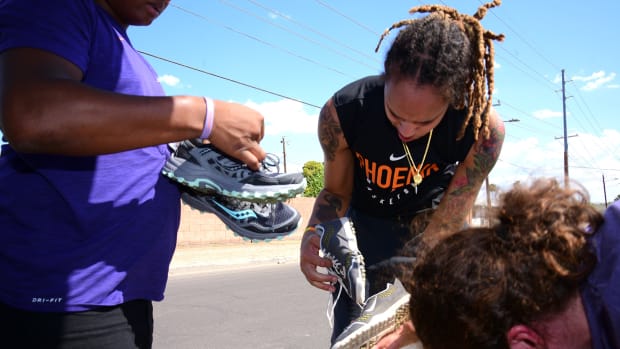The star WNBA center is detained in Russia, but that hasn't stopped the league from continuing her commitment to service.
Danny Dahm pulled up to Phoenix’s Footprint Center in a white van with the words “HOPE COACH” stickered onto its hood. In the summer of 2017, he was tasked with picking up Mercury star Brittney Griner from the city’s downtown arena so that she could take part in a Phoenix Rescue Mission program delivering shoes, hygiene kits and socks to people in the area who were experiencing homelessness. Dahm assumed Griner would have an aura of arrogance about her, considering her stature within the world of basketball. But when the 6-foot-9 Griner folded into the front right passenger seat of the vehicle, he was struck by her friendly presence. They started to chat. “Just like we were friends,” he remembers.
That afternoon, for at least three hours, Griner helped the mission provide services to people who were largely unhoused. At one moment during their outreach, a woman, who Dahm says was wearing “dirty, sweaty clothes,” walked up to Griner and said she wanted to get shoes for herself and her brother, who was staying at a nearby encampment. The woman then asked Griner to wait as she went back to her camp to find something to be autographed. Fifteen minutes later, she returned wearing an oversized white T-shirt, which Griner proceeded to sign.

Courtesy of Phoenix Mercury
Five years later, Dahm remembers his interactions with the Mercury center in great detail. He does so, though, not only because of Griner’s current predicament—last Thursday, a Russian court sentenced Griner to nine years in a penal colony following her conviction on drug smuggling charges—but because the woman whose shirt she signed later joined the mission and went through its rehabilitation program. While the woman progressed through it, Dahm recalls, she repeatedly told the story of meeting Griner. “[Griner] said something encouraging to her, and it changed her,” says Dahm, who is a graduate of the mission’s transformations recovery program and has been employed there for the last five years.
Since 2016, Griner has taken part in shoe drives with the Phoenix Rescue Mission. In recent months, despite her physical absence—the United States government has for months classified Griner as being wrongfully detained—similar efforts have taken place in every WNBA market, assisting people in local communities while also keeping Griner’s name top of mind in the process.
The Mercury organization has also held three outreaches with the mission this summer, its most recent coming earlier this week. And with reminder announcements at every home game, it has collected more than 2,000 pairs of shoes, the most in any season since its partnership began and more than what was gathered in the first four years of its efforts combined. “To be doing it without her this year is certainly a challenge for a lot of us, but all along felt like the right thing to do,” Mercury president Vince Kozar says. “This is what she would be doing.”
Griner’s interests in the effort stem from an early-season encounter in 2016, when she was driving home from practice and saw an overpass with unhoused people underneath. After workouts a day later, she found Kozar and asked whether it would be O.K. if she drove around with shoes in her trunk, “in case I saw people like this again,” Kozar recalls her saying to him.
Kozar, who has been with the organization since 2006, told her she didn’t need to ask for his permission. Then, he proceeded to weigh in with a related suggestion: “What if we made it bigger? And what if we let the fans help you, and found us a community partner so that the impact would be larger?” Griner agreed, and helped handpick the Phoenix Rescue Mission.
Because of her connection to it, Kozar says it made perfect sense for the shoe drive to become a way to keep Griner’s name relevant.
“It’s kinda incredible what BG did, ’cause when BG was doing it she didn’t do it for attention,” guard Diana Taurasi says. “She was always trying to give more than take. And I think that’s her legacy more than anything.”
Rich Heitz, a street outreach case manager at the mission, passed out shoes, hygiene kits and socks with Griner in 2018 and ’19. He, too, recounts Griner’s generosity and eagerness. The Mercury center, he remembers, would dig through the pile of shoes to find the right sizes for people. He recalls her being empathetic in conversations and providing hugs to those who walked up to the organization’s van.

Courtesy of Phoenix Mercury
Such affinity compelled Heitz to recently write a letter to Griner. (Her agent, Lindsay Kagawa Colas, has said Griner has been able to receive written correspondence from friends and family during her detention.) “It was amazing to see you interact with the homeless population,” he wrote. “I was one of the homeless for years, and watching you was encouraging to me.”
Mail, Heitz wrote, “is what I call love from outside the bars.” Having been incarcerated for eight inconsecutive years, he says that “if I got a letter from a family member it meant I still had a chance with them” and that “people still care[d].” In writing his now, he sought to put a smile on Griner’s face.
Dahm, too, wrote a letter to Griner. While he doesn’t know for certain whether she’s read it, he hopes it was a reminder of encouragement if she did. “I remember my ideas of who I thought she was and I remember the heart change I had,” he says. “And I truly believe she has a heart for wanting to make change and help the people here.”
The Hope Coach, full of sneakers, is waiting for her return.
More WNBA Coverage:
• Brittney Griner Lost Long Before Her Conviction
• How Russia Pushed the WNBA to a Crossroads
• Mercury Focus on the Big Picture Amid Griner’s Conviction